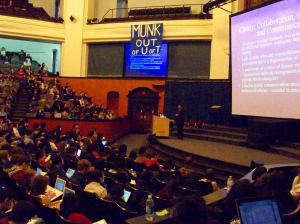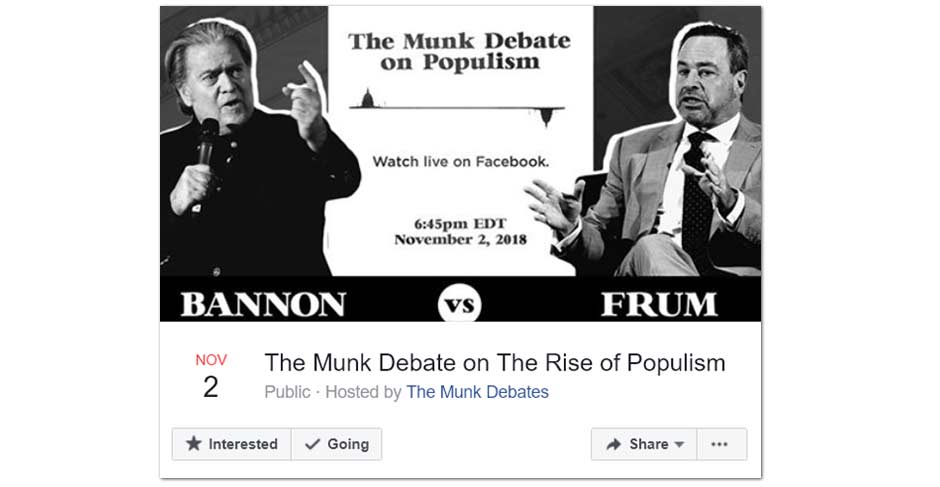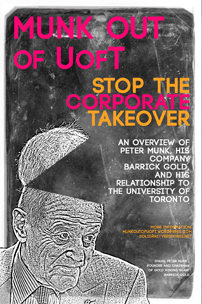If there was ever any doubt that the Munk School’s creation was marked by corruption and secrecy, this revelation should confirm our long-standing suspicions. This week, Barrick announced that it would be adding ex-University of Toronto President, David Naylor, to the companies list of “independent” directors. This appointment comes just four years after Naylor signed the controversial “Munk Contract” in secret, by-passing even the school’s governing council.
The contract named the school “in perpetuity” after Munk, laid out conditions under which Munk could oversee the school’s programs, and mandated that all announcements and publicity concerning the School and the donations be made in consultation with Munk. The contract also gave the sole ability to cancel the contract to the Munk Foundation. Despite the fact that this contract carried with it a host of ethical and governance concerns, it was approved by only a handful decision-makers at UofT, including David Naylor, in a highly irregular process.
At a Governing Council orientation session on September 10, 2009, the Chair informed governors that the first Council meeting scheduled for October 22, 2009 would be cancelled due to insufficient items on the agenda. This cancellation was invalid according to the Council’s By-Law 2 because it had been decided upon by an online ballot that at that point, had not been ratified by the Executive Committee. It was also highly irregular given that the first cycle of meetings of the Governing Council had not been cancelled in over ten years. This meeting cancelation also allowed for the extension of Summer Executive Authority which was delegated on June 23, 2009 and allowed for the concentration of decision-making powers with the President, Chair and Vice-chair of the Governing Council, in consultation with the Chairs and Vice-Chairs of the Boards and Committees until December 10, 2009.
It was during this extended period of supposed inactivity at the Governing Council that the donation and memorandum between the Munk Foundation and the University – signed on behalf of the Governing Council – was approved without any form of consultation with governors or with the students, faculty and staff. The Secretary and Chair of the Governing Council also did not make any effort to inform Governing Council about the decision, memorandum and donation at the December 10, 2009 meeting of the Governing Council- as is the practice (to report on any and all approvals made under Summer Executive Authority). In fact, it was not until several months later – on April 12, 2010 – that the members of Governing Council were first made aware of the proposed Munk donation.
In a confidential memorandum from the Assistant Secretary of the Governing Council, Henry Mulhall, asked the governors to consider a proposed change to the name of the School of Global Affairs to the Munk School of Global Affairs. Governing Council members were given just 24 hours to register their comments. Even at this late stage, the details of the donation and memorandum were withheld from the governors and the University community.
Now, it appears that Naylor’s favours have returned to his personal coffers. Despite having no background in mining, the UofT ex-president has a seat on Barrick’s board of directors. This is not the first controversy to surround the Munk school appointees. Michael Ignatieff, former head of the Liberal party, was rumoured to have Munk School ties when he was speaking publicly against a Liberal Party-sponsored bill that would have introduced minimal standards for Canadian mining companies operating abroad. The Bill – C-300 – lost the vote by a mere 6 votes, with Barrick Gold singled out

Munk OUT of UofT drops a banner during a class that Naylor guest lectured in Convocation Hall at the University of Toronto. (April 2011)
as the number one opponent lobbying against the bill. Less than two years later, on September 7, 2012, Ignatieff joined the Munk School as a half-time professor.
Another controversy involving a Munk-appointee involves Marketa Evans, a former director of the Munk Centre for International Studies. Ms. Evans was appointed as the first Corporate Social Responsibility (CSR) Councillor for the Canadian government, whose job it was to mediate disputes between mining companies in impacted communities.
Marketa’s position was criticized by many as being “designed to fail”. Corporations could enter or leave the process at any time voluntarily, and most did. Of six cases opened during Evans’ tenure, who resigned in October of this year, three were closed after the companies walked away — the most recent in September of this year. One case was sent back to a company’s internal process and two remain open. Critics say they expect no resolutions to result.
The Munk School’s next director Janice Stein, is no less controversial. Stein openly supported the dismantling of Canada’s International Development Agency to merge with the Department of Foreign Affairs, being quoted in several articles and writing an editorial in the Globe and Mail supporting the move. Meanwhile, the merger was part of a shift in CIDA to start supporting CSR projects for mining companies abroad, including Barrick Gold.
A bit closer to home, Stein visited a Munk OUT of UofT organizing meeting once, insisting to get a chance to speak. She poorly defended the Munk contract and then took questions from the people present. One Munk OUT of UofT coalition member, Angela Regnier, who was then Executive Director of the UofT student union, asked a question about the SLAPP suit that Barrick Gold had against three academics in Montreal. Janice said that she didn’t know about the case, but would follow up with Angela, taking her card. Within days, Angela received both an e-mail and phone calls from Barrick’s lawyers, with vague threats about the spread of “misinformation” by the Munk OUT of U of T campaign.
Thankfully, Angela’s primary issue in life is academic freedom, and so she proceeded to continue her support for the campaign and spoke openly about her encounter with Barrick’s lawyers. So, Naylor’s appointment is not the first, and likely won’t be the last corrupt relationship between the University and Barrick Gold, forwarding the interests of mining within the structure of a School of Global Affairs.



 Join us for the Toronto premiere of SILENCE IS GOLD, a film that explores the state of free-speech in a corporate dominated world. This screening is co-presented with the MiningInjustice Solidarity and Point of View Magazine. Sakura Saunders and guest speakers will be in attendance.
Join us for the Toronto premiere of SILENCE IS GOLD, a film that explores the state of free-speech in a corporate dominated world. This screening is co-presented with the MiningInjustice Solidarity and Point of View Magazine. Sakura Saunders and guest speakers will be in attendance.
